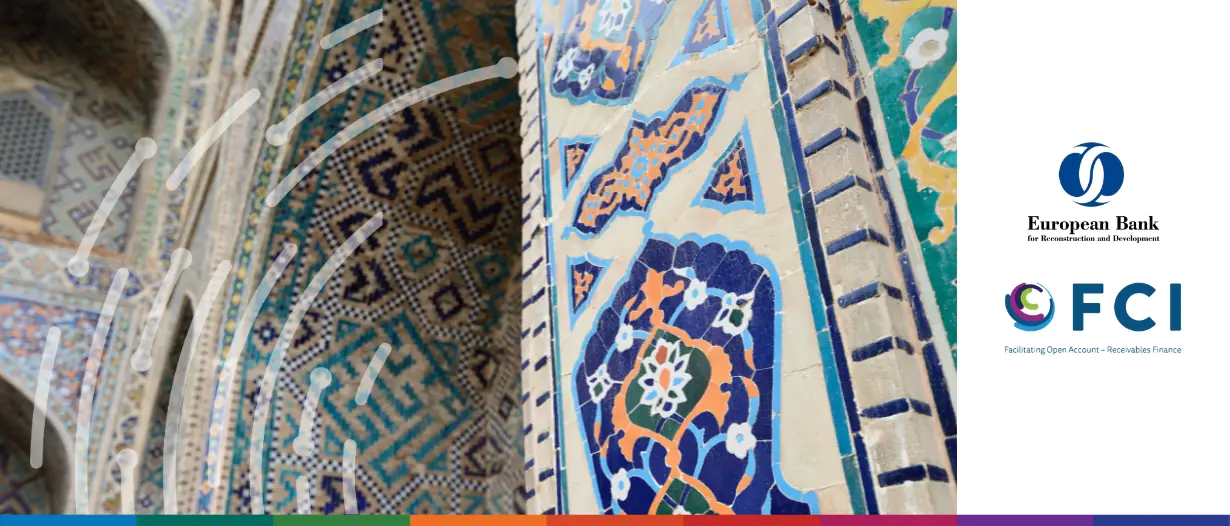Estimated reading time: 5 minutes
Listen to this podcast on Spotify, Apple Podcasts, Podbean, Podtail, ListenNotes, TuneIn
During the European Bank for Reconstruction and Development’s (EBRD) 32nd Annual Meeting and Business Forum in Samarkand, Uzbekistan, Trade Finance Global spoke with several industry leaders to learn more about the particulars of a first-of-its-kind transaction.
FCI’s role in the facility
For several years, FCI has supported EBRD in various areas, including education and legal framework support.
Recently, a significant step FCI has taken to help facilitate cross-border transactions has been to develop a state-of-the-art, high-secure electronic data interchange (EDI) platform called EdiFactoring, which allows financial institutions (FI) to communicate and participate in risk distribution.
The EdiFactoring platform is a risk distribution system that allows FIs to distribute the risk of an open account transaction. The messaging system has facilitated over €1 trillion in transactions to date. Still, now the system has been used to facilitate a real-world trade between Armenia and Georgia for the first time.

Facilitating the first-ever cross-border factoring facility between Armenia and Georgia
This first transaction involved an Armenian chocolate factory importing confectionery products from a Georgian confectionery distributor with the help of the EBRD, TBC Bank, and ArmSwissBank.
Tamar Gugushvili, head of trade finance and documentary operations unit at TBC Bank, said, “We are very happy and proud that this transaction is the first international inter-regional factoring deal supported by EBRD’s standby letter of credit.”
While the transaction structuring was challenging because there was no precedent, EBRD, ArmSwissBank, and TBC Bank collaborated to develop a secured payment scheme, which was also adapted to the FCI platform and structure.
ArmSwissBank issued a payment guarantee in favour of TBC Bank, which secured the obligations of data for the payment of all account receivables assigned to TBC Bank and the factoring contract.
This payment guarantee was then backed by EBRD’s standby letter of credit (SBLC), enabling TBC Bank as an export factor to book the risk on ArmSwissBank.
Anzhela Barseghyan, trade finance and correspondent relationship department director at ArmSwissBank, said, “One serious challenge we faced was the price. We had to keep the price affordable, and the fact that ArmSwissBank issued a payment guarantee in favour of TBC Bank, which was backed by EBRD’s SBLC, allowed TBC Bank to offer low-cost financing solution to the exporter.”
While notable in its own right, the novel structure successfully provided several other long-term benefits. It demonstrated a practical blueprint for structuring cross-border factoring transactions with counterparties that may otherwise need help to do business together.
Moreover, the transaction helped to deliver improved receivables and payables cycles for small- and medium-sized enterprises (SMEs) – which are the most affected by the trade finance gap – at an affordable rate.
It also served as a catalyst to encourage private sector import and export growth in Georgia and Armenia and established a corresponding relationship between the banks, which is anticipated to lead to cooperation in other forms of products in the future.
Peter Mulroy, secretary general at FCI, said, “This is the very first transaction where a development bank had provided a guarantee within the EdiFactoring environment. It really enhanced the transaction and as a result of its uniqueness and the many benefits that the transaction resulted in, it was one of the top winners of the Best Deal of the Year award at the FCI annual meeting in Washington, DC last year.”

Future opportunities
From a high level, there are certainly more opportunities for multinational development banks or other development finance institutions to facilitate trade on FCI’s factoring platform.
Development finance institutions play a crucial role in mitigating cross-border trade risks, especially in countries with a lack of confidence between counterparties or where the financing gap is significant.
By establishing guarantee mechanisms, these institutions can protect banks in one country and allow them to fund receivables from buyers in high-risk countries, which would otherwise not be possible.
Promoting innovative financing solutions can have further benefits down the road for the many smaller firms that may not currently have access to traditional financing mechanisms.
Nana Khurodze, associate director, senior banker of the Trade Facilitation Program at EBRD, said, “Unlike a traditional lending relationship, factoring and supply chain finance allows suppliers with weak credit ratings to access funding based on the value of their receivables or approve the invoice in the case of supply chain finance.”
It is a promising indication that factoring and supply chain finance are fast-growing sources of short-term financing for micro, small, and medium-sized enterprises.
However, with any financial transaction, there are potential risks involved, one of which is the potential risk of currency volatility which can lead to fluctuations in the exchange rate and can ultimately affect the transaction’s profitability.
Another risk is the possibility of political instability or conflict in the buyer’s country, which can disrupt the supply chain and impact the ability to collect receivables.
By identifying potential risks and implementing appropriate risk mitigation strategies, these institutions can help ensure the transaction’s success and benefit both the corporates and SMEs involved, as well as the partner banks.

































